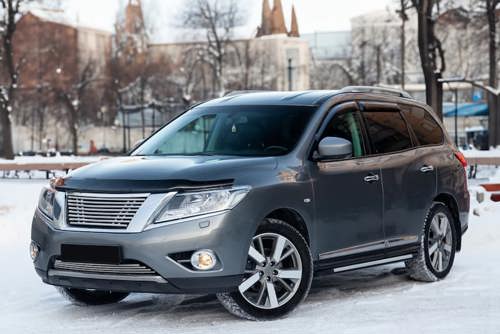With a wide range of tire types available, it can be challenging for drivers to choose the best replacement tire for their vehicle, lifestyle, and location. That's why keeping up with tire industry trends and product innovations is crucial for our team of Hercules Tires dealers.
The tire industry is highly competitive, driving year-round advancements like all-weather tires that offer unmatched benefits for drivers. Fortunately, all-weather tires prove to be a valuable option for those who drive in unpredictable climates year-round. Rather than choosing between snow tires and all-season tires, all-weather tires provide a versatile solution, delivering exceptional performance in spring and summer while maintaining superior snow grip and handling in winter conditions.
Read on to enhance your knowledge about the differences between all-weather, all-season, and winter tires and make informed decisions about your next purchase.

What are all-weather tires?
All-weather tires offer the best of both worlds, combining the advantages of summer and winter tires. What sets them apart from all-season tires is the Three-Peak Mountain Snowflake (3PMSF) certification, which guarantees reliable snow grip and handling in winter weather.
All-weather tires are versatile and designed to perform exceptionally well in both warm weather and challenging winter conditions. These tires maintain flexibility in colder temperatures while providing optimal performance throughout the year.
Additionally, all-weather tires are made from an advanced rubber compound that promotes even wear, enhanced traction, and prolonged tread life to ensure peace of mind all year round and eliminate the hassle of seasonal tire swaps.

Who benefits from all-weather tires?
All-weather tires are highly versatile and excel in various road conditions, including wet, dry, slush, ice, and snow. Plus, with all-weather performance, drivers benefit from braking power in snowy conditions (when compared to all-season tires) and optimal performance in temperatures as low as 46 degrees Fahrenheit.
Designed for year-round use, all-weather tires are suitable for a wide range of vehicles, from CUVs to SUVs to trucks. They offer excellent control and shorter braking distances on wet, dry, or slippery roads, and – in comparison to all-season tires – all-weather tires offer a year-round solution for better mileage and improved handling in snowy conditions. However, it's important to note that dedicated winter tires are always the safest option for drivers who live in a region that’s impacted by severe winter weather conditions

What’s the difference between all-weather tires and all-season tires?
All-season tires are a popular choice with today's drivers due to their benefits and wide range of options available to meet performance needs. Many all-season tires also come with an M+S (Mud + Snow) rating, which ensures reliable traction on muddy and lightly snow-covered surfaces.
Both all-season and all-weather tires provide excellent tread life, excellent rain traction, and a comfortable, quiet ride, however, while all-season tires perform well in dry and wet conditions, they are not recommended for heavy snow and harsh winter weather.
To ensure dependable performance in all weather conditions, including excellent traction during winter, it is highly recommended that drivers choose all-weather tires certified with the 3PMSF (Three Peak Mountain Snowflake) symbol.
Should I get all-weather tires or winter tires for snow season?
When temperatures drop in winter, it's crucial to have the right tires for optimal handling, cornering, and braking performance.
While all-weather tires are 3PMSF certified for winter driving, they don't match the specialized performance of dedicated winter tires in extreme conditions. In fact, winter tires are designed to excel in temperatures below 46 degrees Fahrenheit, conquering icy and snowy roads.
So, if your customer's daily commute involves such severe winter weather conditions, winter tires are the ideal choice for superior safety and performance on the road.
Introducing Premium All-Weather Performance
The Terra Trac Cross-V AW is a premium highway/touring/all-weather tire engineered for peak performance in all seasons. Our newest entry to the Terra Trac family maintains and improves upon the performance attributes our customers and tire dealers have enjoyed since 2014 with the original Terra Trac Cross-V tires. As we transition into the all-new replacement product, we’re very confident with the product quality and performance. Benefits include:
- All-weather capability with Three-Peak Mountain Snowflake (3PMS) certification for safety and reliable traction in all seasons, including winter weather conditions (in temperatures as low as 46 degrees Fahrenheit)
- Improved performance and year-round driving confidence, without having to sacrifice durability and treadwear
- Enhanced grip, handling, braking power, and stability through updated tread tire pattern and design
- Increased durability with a premium tire construction made to provide fast cooling in the areas where heat is generated during high-speed driving
- A 65,000-mile treadwear warranty that we call the Hercules Tires Performance Promise, which also includes a 45-day “Trust our Ride” trial period and road hazard protection, as well as workmanship and materials coverage.
To discover more about the all-new Terra Trac Cross-V AW, click here to visit our official product landing page OR to get rolling with a new set from Hercules Tires, click here to find a dealer near you.

Ask a Hercules Tires Dealer: "What’s the Difference Between All-Weather, All-Season, and Winter Tires?"
Make an informed decision about the right tire type for your vehicle.